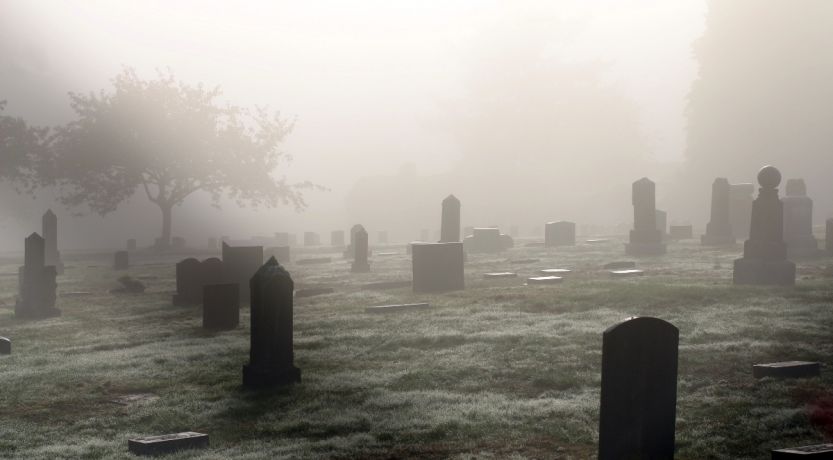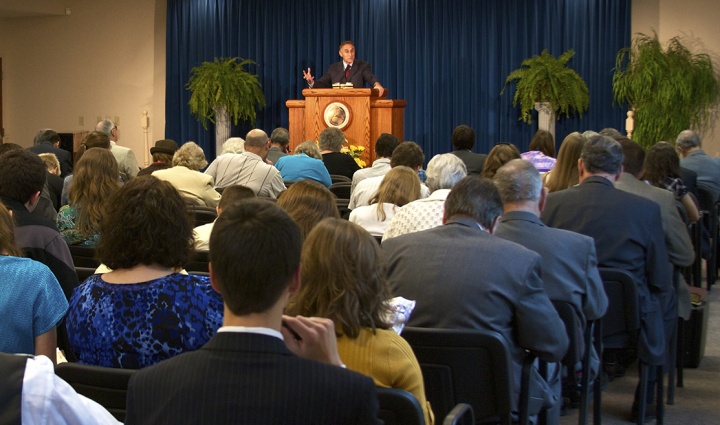.
Zombie Movies: What Do They Get Right?
 “They may be mindless entertainment, but is there anything zombie movies and shows actually get right?
“They may be mindless entertainment, but is there anything zombie movies and shows actually get right?
Zombies. They seem to be all around us—at least in the entertainment world. But we all know they aren’t real, right?
We are told that they are the walking dead, the living dead, the undead. They have their own nation Z, and they are about to unleash an apocalypse upon the rest of us. Have you ever tried to make sense of this zombie thing?
How is it that an undead person can crawl out of a grave (or be infected with a virus) and become a menace to the living? Why do they supposedly feast on the bodies of the living? How do they even know who is living and who is undead like themselves? And why do they walk like that—all stiff-kneed and halting? Are knees (and apparently elbows) the only things that stop working when you are undead?
And what happens when they finally take over and everyone is undead?
A bunch of nonsense?
If you are like me, you might think the whole zombie thing is just a bunch of nonsense. The idea of a dead person coming back to life? That’s simply ridiculous! When you’re dead, you’re dead, right?
Doesn’t the Bible confirm this when it says, “For dust you are, and to dust you shall return” (Genesis 3:19)? And, “For the living know that they will die; but the dead know nothing” (Ecclesiastes 9:5)? That sounds like the dead are dead—for good.
When is the impossible possible?
On the other hand, is there anything that the zombie genre gets right? Believe it or not, there is one slight shred of truth behind the idea of zombies—the dead actually are coming back to life!
Humans have long been fascinated by the concept of the dead coming back to life, but have found it to be impossible. The truth is, it’s not impossible at all when the Creator of life Himself is involved.
God is going to bring back the dead. He promises!
Can these bones live?
As he viewed in a vision the bones of thousands of dead people, the prophet Ezekiel was asked by this Creator of life, “Son of man, can these bones live?”
Ezekiel answered, “O Lord GOD, You know” (Ezekiel 37:3). Most would give the same answer today because they really have no idea if the dead can come back to life. Isn’t that the stuff of Frankenstein and zombie stories? The dead returning to the land of the living may be entertainment to some, but such make-believe has no real connection to most people and their everyday lives.
But what about you? You may be surprised to find that your Bible actually speaks quite often about the dead coming back to life. You, like most others, may be unaware that Jesus Christ stated nothing about an immortal soul going off to heaven when you die, but rather said, “Do not marvel at this; for the hour is coming in which all who are in the graves will hear His voice and come forth—those who have done good, to the resurrection of life, and those who have done evil, to the resurrection of condemnation” (John 5:28-29).
Yes, Jesus taught that humans will be brought back to life after sleeping in death!
The apostles believed what Jesus said and therefore taught the same thing. “I have hope in God, which they themselves also accept, that there will be a resurrection of the dead, both of the just and the unjust,” Paul declared to the Roman governor Felix (Acts 24:15).
Resurrection literally means “standing up again.” Since a dead person cannot stand (even with stiff knees and elbows), resurrect means to be raised from the dead to become living once again.
In spite of Dr. Frankenstein’s best efforts, bringing one back from the dead is impossible when humans are the highest power involved. But when the Creator is involved, the dead can be—and will be—brought back to life, no matter if they were buried, cremated or lost at sea.
A counterfeit
Sad to say, what zombie movies depict is a counterfeit resurrection to some sort of nearly dead condition where the undead attack, terrorize, kill and destroy. These erroneous ideas unfortunately can prejudice people’s minds against the good news that the dead will, in fact, come back to life. But not in a condition of half-alive and half-dead. The truth of your Bible is quite different.
Understanding the mystery
This astounding truth is hidden from so many people that your Bible calls it a mystery (1 Corinthians 15:51). Today this mystery is understood by very few, yet it sits in plain view for those given eyes to see.
We would like you to come to understand this mystery. Your Bible plainly teaches that one group of “the dead will be raised incorruptible” (1 Corinthians 15:52). There is a resurrection, either to physical life or immortal life, in your future!
More than one
Savvy readers will have noticed in both Jesus’ and Paul’s words quoted earlier, a teaching of at least two different times of resurrection from the dead. There is a coming first resurrection—of the just, those who had been justified—and a second resurrection—of the unjust, those who had not yet been forgiven. Note that since “all have sinned” (Romans 3:23), the just refers to those who have repented and been forgiven and lived faithfully.
If this biblical teaching about resurrections from the dead is new to you, please read our article “Resurrections: What Are They?”
Paul elaborated on this first resurrection to spirit life. “Behold, I tell you a mystery: We shall not all sleep, but we shall all be changed—in a moment, in the twinkling of an eye, at the last trumpet. For the trumpet will sound, and the dead will be raised incorruptible, and we shall be changed. For this corruptible must put on incorruption, and this mortal must put on immortality” (1 Corinthians 15:51-53). We don’t have immortality now, but can have it at that time.
Ezekiel makes us aware of a second resurrection, one to physical life, for those who had been unjust. “Thus says the Lord GOD to these bones: ‘Surely I will cause breath to enter into you, and you shall live. I will put sinews on you and bring flesh upon you, cover you with skin and put breath in you; and you shall live. Then you shall know that I am the LORD’” (Ezekiel 37:5-6).
No half-dead zombies, but vibrant new lives in full health, ready for what God has in store for them.
One of the key phrases here is, “Then you shall know that I am the LORD.” From this we learn that these unjust brought to life in this second resurrection had not really known the true God during their first life. Now they’ll have the opportunity to do so.
Celebrations of new life
The first resurrection is such a vital part of God’s plan that He reminds us of it in an annual celebration. It’s called the Feast of Trumpets. On this day we celebrate and anticipate what Jesus Christ will do in the near future. The Feast of Trumpets anticipates His return and, with it, the first resurrection.
“For the Lord Himself will descend from heaven with a shout, with the voice of an archangel, and with the trumpet of God. And the dead in Christ will rise first” (1 Thessalonians 4:16).
The dead in Christ—dead Christians—are asleep in the grave awaiting the wake-up call of the last trumpet. They will not be zombies, but glorious, powerful spirit beings because “we know that when He is revealed, we shall be like Him, for we shall see Him as He is” (1 John 3:2). Paul adds, “We shall also bear the image of the heavenly Man” (1 Corinthians 15:49).
Revelation 20:4 speaks of those resurrected when He returns. “And they lived and reigned with Christ for a thousand years.” This thousand-year reign is pictured by another biblical festival, the Feast of Tabernacles.
But there is yet another biblical holy day—called the Eighth Day or Last Great Day—that foretells another resurrection, the resurrection of all those who were not “dead in Christ.” These are the “rest of the dead” who “did not live again until the thousand years were finished” (verse 5). What happens when they are resurrected?
“Then I saw a great white throne and Him who sat on it, from whose face the earth and the heaven fled away. And there was found no place for them. And I saw the dead, small and great, standing before God, and books were opened. And another book was opened, which is the Book of Life. And the dead were judged according to their works, by the things which were written in the books” (Revelation 20:11-12).
The unjust who didn’t know God will now have the opportunity to come to know God and become just. The books of the Bible and the Book of Life, previously closed to them, will be opened for them.
God explained it this way to Ezekiel: “‘Then you shall know that I am the LORD, when I have opened your graves, O My people, and brought you up from your graves. I will put My Spirit in you, and you shall live, and I will place you in your own land. Then you shall know that I, the LORD, have spoken it and performed it,’ says the LORD” (Ezekiel 37:13-14).
If you are not familiar with these annual celebrations that the Bible calls holy days, we invite you to read “Trumpets, Atonement, Tabernacles & the Eighth Day.” Check them out in your own Bible, and ask God to open your mind to understand what the Bible tells us to do.
A coming reality
No, zombies are not going to come crawling—or stiffly walking—out of the grave to begin an apocalypse. All of that is clearly fiction and a human distortion of God’s truth.
But there is a coming reality—a real resurrection from the dead—that will give every human an opportunity to walk in eternal life!” From: https://lifehopeandtruth.com/life/life-after-death/resurrections/zombie-movies-what-do-they-get-right/
________
The Eighth Day. (Tuesday, Oct 18th, 2022 in most places.)
“God has a merciful and loving plan for ALL of mankind, The final commanded festival of God, the Eighth Day is a beautiful representation of this plan.
“Immediately following the seven-day Feast of Tabernacles is another Holy Day or Sabbath—referred to in Scripture simply as "the eighth day" (Leviticus 23:36, Leviticus 23:39). This day pictures the most joyful of all events yet to take place in God's great plan.
We should consider that the celebration of the ingathering of all humanity is not complete with the 1,000-year reign of Christ. For what about all those who died in this age who were not called as part of God's firstfruits? There will yet remain billions of people from this age who are not saved. So are they forever lost?
Many Bible students realize that one day we will all stand before the judgment seat of Christ (2 Corinthians 5:10). What most don't realize is that for those who died without the true knowledge of the plan of salvation, the time will come when they will be resurrected to physical life and given their first opportunity to really understand God's plan and make an informed choice about it.
Revelation 20:11-15 speaks of this time yet to come 1,000 years after the "first resurrection" (Revelation 20:6), when "the rest of the dead" will in a second resurrection be restored to life (Revelation 20:5). Ezekiel 37:1-14
describes the same period—a time when those who seemed doomed with all hope lost (Ezekiel 37:11) will be raised to life again. They will be astonished to find out that God will offer to them His Holy Spirit (Ezekiel 37:14) and give them the opportunity to really know for the first time just who the true God is (Ezekiel 37:13).
This vision, then, speaks of the time when all humanity who never sufficiently understood God's truth will at last come to know it. It will be at this time that they will have to decide whether or not they will serve God. In other words, their salvation is dependent on whether or not they will choose to accept Jesus' shed blood for their sins and serve God faithfully once they come to know Him.
This will be a time of judgment in the sense that the new lives of these multitudes will be under evaluation. Those who stay on the right path with God's help will be saved. Those who ultimately reject God are the only ones who will be condemned in the end. Undoubtedly, most of humanity will make the right decision to obey Him and continue in His ways.
God, in His great wisdom, has a plan to offer everyone who has ever lived an opportunity to inherit eternal life. He is calling some to repentance now, and the rest He will call during the millennial reign of Christ and the second resurrection period that follows.
If you have read this far and are coming to understand God's great plan, perhaps you are being called at this time. May God help you to respond to His call to receive Jesus Christ and follow His ways—including observance of these important festivals that show the way to eternal salvation in God's family!” From: https://www.ucg.org/beyond-today/beyond-today-daily/the-eighth-day-gods-plan-for-mankind
________
Evidence-Based Medicine or Evidence-Biased?
To see any graphs, charts, graphics, images, and quotes to which Dr. Greger may be referring, watch the video at: https://nutritionfacts.org/video/evidence-based-medicine-or-evidence-biased/
Transcript: “Evidence-based medicine may ironically bias medical professionals against the power of dietary intervention.
Dr. Esselstyn’s landmark study showing even advanced triple vessel coronary artery disease could be reversed with a plant-based diet has been criticized for being such a small study. But the reason we’re used to seeing such large studies is they typically show such small effects.
Drug manufacturers may need to study 7,000 people in order to show a barely statistically significant 15% drop in ischemic events in a subsample of patients, whereas Esselstyn got a 100% drop in those who stuck to his diet—all the more compelling given that those 18 participants experienced “49 coronary events [such as heart attacks] in the 8 years before” they went on the diet. And these were the worst of the worst—most of whom having already failed surgical intervention. So, when the effects are that dramatic, how many people do you need?
Before 1885, symptomatic rabies was death sentence until July 6th, when little Joseph Meister became the first to receive Pasteur’s experimental rabies vaccine. “The results of this [and one other] case were so dramatic compared with previous experience” that the new treatment was accepted with a sample size of two. So dramatic, compared with previous experience, no randomized controlled trial was necessary. “Would you—having been infected by a rabid dog—be willing to participate in a randomized controlled trial…when being in the control group had a certainty of a ‘most awful death’?” Sadly, such a question is not entirely rhetorical.
In the 1970s, a revolutionary treatment for babies with immature lungs called ECMO, extracorporeal membranous oxygenation, “transformed mortality in these [babies] from 80 per cent [down] to 20 percent, nearly overnight”—from 80% dead to 80% alive. Despite this dramatic success, they felt forced to perform a randomized controlled trial. They didn’t want to. They knew they’d be condemning babies to death. “They felt compelled to perform [such] a trial, because their claim that ECMO [worked] would, they judged, carry little weight amongst their medical colleagues unless supported by a [randomized controlled] trial.”
And so, at Harvard’s Children’s Hospital, 39 infants were randomized to either get ECMO or not—just get conventional medical therapy. They decided to stop the trial after the fourth death, so as not to kill too many babies. And, that’s what they did. The study “was halted after the fourth [conventional medical therapy] death,” at which point nine out of the nine ECMO babies had survived. Imagine being the parent of one of those four dead children—just as one can imagine being the child of a parent who died from conventional medical or surgical therapy for heart disease.
“Medical students in the United States are taught [very] little about nutrition. Worse yet, their training [actually] biases them against the studies that show the power of dietary approaches to managing disease,” by encouraging them “to ignore any information that does not come from…double-blind, randomized controlled trial[s]. Yet human beings cannot [easily] be blinded to a dietary intervention.” They tend to notice what they’re eating. As a result, physicians [may be] biased [in favor of] drug treatments and against dietary interventions for the management of chronic disease.”
“Evidence[-based medicine] is a good thing. However, the medical profession [may be] focusing too much on one kind of evidence, to the exclusion of [all] others”—degenerating into a “ignoring-most-of-the-truly-important-evidence[-based] medicine.”
And heart disease is the perfect example. On a healthy-enough plant-based diet, our #1 cause of death may “simply cease…to exist.” The Cornell-Oxford-China Study showed that even “small amounts of animal-based foods [was] associated with small, but measurable increases in [the] risk of [some of these chronic] disease[s].”
“In other words, the causal relationship between dietary patterns and coronary artery disease was already well established before…Ornish…and…Esselstyn…undertook their clinical studies. The value of their studies was not so much in providing evidence that such a dietary change would be effective, but in showing that physicians can persuade their patients to make such changes,” and also providing interesting “data on the speed and magnitude of the change in severe atherosclerotic lesions as a result of dietary therapy.”
So, “[a]ny complaints that these studies were small or unblinded are simply irrelevant. Because the evidence of the role of diet in causing atherosclerosis is already so overwhelming, assigning a patient to a control group [eating the Standard American Diet could be considered a] violation of research ethics.”
“Evidence of the value of…plant-based diet[s] for managing [chronic disease] has been available in the medical literature for decades.” Kempner at Duke; John McDougall; The Physician’s Committee for Responsible Medicine. “Denis Burkitt warned us” that the Standard American Diet “is the standard cause of death and disability in the Western world,” for decades. “Yet physicians,…in the [U.S.], are still busily manning the ambulances at the bottom of the cliff instead of building fences at the top.”
More on this subject at: https://nutritionfacts.org/video/fully-consensual-heart-disease-treatment/ Fully Consensual Heart Disease Treatment
________

 “The jack-o’-lantern is now associated with the holiday of Halloween. Where did this mysterious symbol come from? What should we do with that knowledge?
“The jack-o’-lantern is now associated with the holiday of Halloween. Where did this mysterious symbol come from? What should we do with that knowledge? “They may be mindless entertainment, but is there anything zombie movies and shows actually get right?
“They may be mindless entertainment, but is there anything zombie movies and shows actually get right? “The feasts of the Lord, which you shall proclaim to be holy convocations, these are My feasts" (Leviticus 23:2). Here God Almighty says in Scripture that these are His feasts. Why are they important to Him? And why should they be important to every Christian?
“The feasts of the Lord, which you shall proclaim to be holy convocations, these are My feasts" (Leviticus 23:2). Here God Almighty says in Scripture that these are His feasts. Why are they important to Him? And why should they be important to every Christian? “How should you observe God's Holy Days?
“How should you observe God's Holy Days?
 Columbus’ Ship Nina
Columbus’ Ship Nina

 “The devil doesn’t like any of God’s holy days, but the Day of Atonement is particularly onerous to him. How should Christians today view this day?
“The devil doesn’t like any of God’s holy days, but the Day of Atonement is particularly onerous to him. How should Christians today view this day? How Foul Is Fowl?
How Foul Is Fowl? Point of View
Point of View











